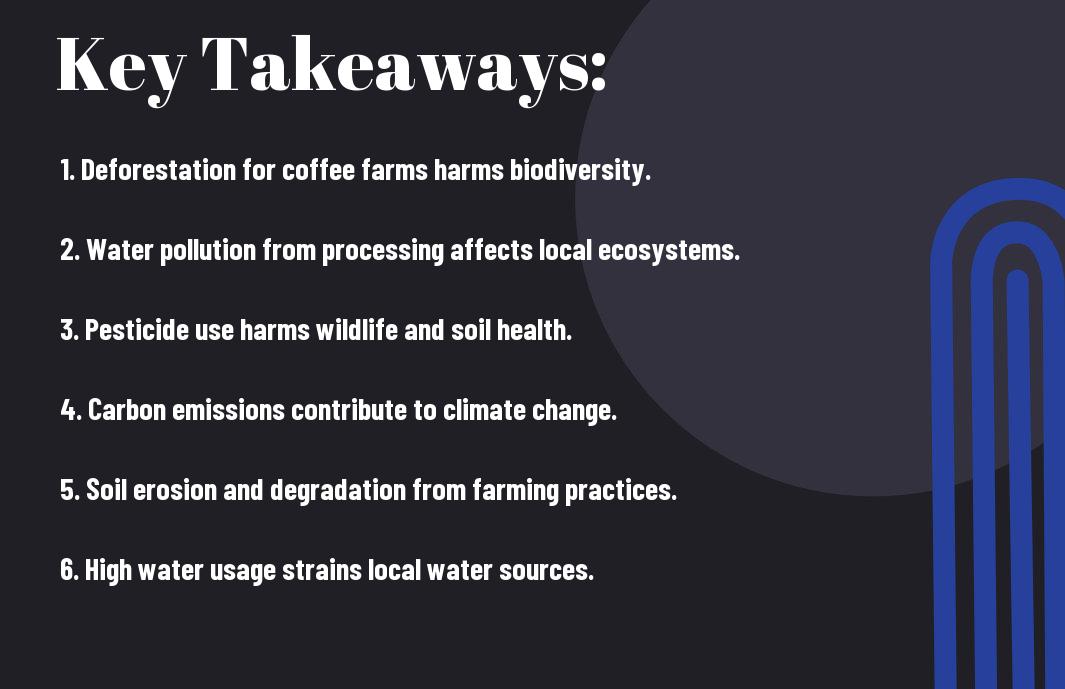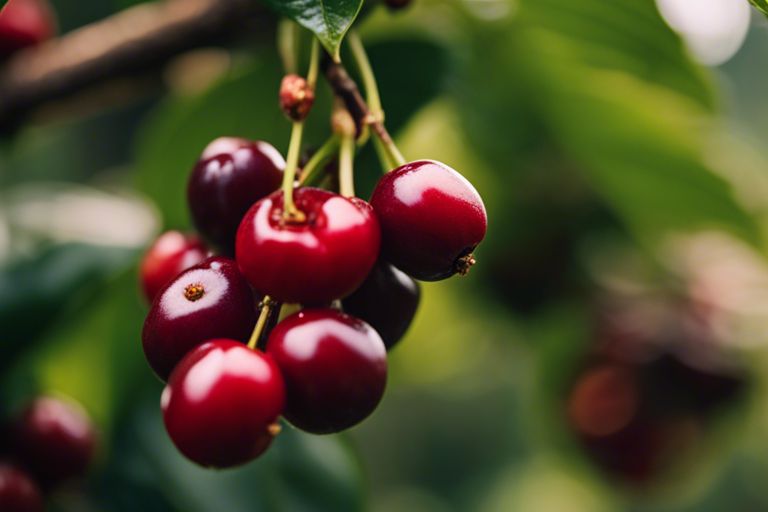Sustainability in coffee production is crucial as the environmental impacts of this beloved beverage are significant. From deforestation for cultivation to pesticide use and water depletion, the journey of coffee beans from farm to cup comes with a hefty ecological price tag. Delving into these impacts can guide us towards more mindful consumption choices and support the preservation of our planet’s precious resources for future generations.

Key Takeaways:
- Water Usage: Coffee production requires substantial amounts of water, contributing to water scarcity in coffee-growing regions.
- Deforestation: Clearing land for coffee cultivation leads to deforestation, negatively impacting biodiversity and ecosystems.
- Chemical Pesticides: The use of chemical pesticides in coffee farming can pollute water sources and harm local wildlife.
- Carbon Emissions: The transportation of coffee beans from farms to consumers results in significant carbon emissions, contributing to climate change.
- Waste Generation: Coffee production generates waste such as pulp, which can contaminate waterways and degrade soil quality.
Environmental Impacts of Coffee Production
Deforestation and Habitat Loss
Environmental impacts of coffee production are significant, with deforestation and habitat loss being major concerns. In order to meet the increasing global demand for coffee, vast areas of forests are cleared to make way for coffee plantations. This results in the destruction of crucial habitats for various plant and animal species. The loss of biodiversity and disruption of ecosystems are consequences of this widespread deforestation.
Water Pollution and Depletion
Water pollution and depletion are also notable environmental impacts of coffee production. The use of fertilizers and pesticides in coffee farming practices can lead to water pollution, contaminating local water sources and harming aquatic life. Additionally, the intensive water usage in coffee cultivation contributes to water depletion in regions where water scarcity is already a pressing issue.
To mitigate the environmental impacts of coffee production, sustainable farming practices such as agroforestry and organic agriculture can be adopted. These methods help preserve biodiversity, protect water resources, and promote the overall health of ecosystems. Consumers can also make a difference by choosing coffee brands that prioritize environmental sustainability and support ethical farming practices.

The Coffee Industry’s Carbon Footprint
Greenhouse Gas Emissions from Farming
Assuming that coffee is grown in regions where deforestation occurs to make way for coffee plants, the farming process can contribute significantly to greenhouse gas emissions. On these farms, trees are cut down to provide space for coffee cultivation, releasing carbon dioxide into the atmosphere. Additionally, the use of fertilizers and pesticides in coffee farming can also contribute to greenhouse gas emissions, such as nitrous oxide and methane.
Transportation and Supply Chain Emissions
Emissions from transportation and the coffee supply chain also play a crucial role in the carbon footprint of the coffee industry. Coffee beans are often grown in remote locations around the world and need to be transported long distances to reach consumers. Whether by ship, plane, or truck, the transportation of coffee beans releases carbon dioxide and other greenhouse gases.
Furthermore, the processing, roasting, and packaging of coffee also contribute to emissions throughout the supply chain. This includes the energy-intensive processes involved in roasting coffee beans and the production of packaging materials.
Overall, the carbon footprint of the coffee industry is substantial, encompassing emissions from farming practices, transportation, processing, and packaging. To mitigate these impacts, initiatives such as sustainable farming practices, carbon offset programs, and the use of renewable energy sources in production facilities can help reduce the environmental footprint of coffee production.

Soil Erosion and Degradation
Monoculture Farming Practices
Soil erosion is a significant environmental issue associated with coffee production, particularly due to monoculture farming practices. When coffee is grown in monocropping systems, where the same crop is grown continuously on the same land, it can lead to soil erosion. Without crop rotation or diversity, the soil is more vulnerable to degradation and erosion. The constant tilling of the land for planting new coffee plants leaves the soil exposed and prone to erosion by wind and water runoff.
Lack of Shade Trees and Soil Cover
Erosion is exacerbated by the lack of shade trees and soil cover in many coffee plantations. Traditionally, coffee was grown under a canopy of shade trees that helped protect the soil from erosion. However, modern coffee production often involves clearing land of native vegetation, including shade trees, to make room for higher-yielding coffee plants. Without shade trees to protect the soil and provide organic matter through leaf litter, the soil becomes compacted and more susceptible to erosion.
Lack of soil cover also means that heavy rainfall can wash away the topsoil, which is rich in nutrients important for plant growth. This loss of topsoil not only affects the productivity of the coffee plants but also leads to sedimentation in nearby water bodies, impacting water quality and aquatic ecosystems.

Pesticide and Fertilizer Use
Chemical Runoff and Soil Contamination
To address the high demand for coffee production, farmers often resort to using pesticides and fertilizers to increase yield. However, the excessive use of these chemicals can have detrimental effects on the environment. Pesticides and fertilizers can easily leach into the soil and contaminate water sources, leading to chemical runoff that pollutes rivers and streams. This contamination not only affects the local ecosystem but also poses risks to human health.
Impact on Local Wildlife and Ecosystems
Pesticides used in coffee production can have a significant impact on local wildlife and ecosystems. These chemicals can harm beneficial insects, birds, and other animals vital for a healthy ecosystem. Additionally, the loss of biodiversity due to pesticide use can disrupt the delicate balance of the ecosystem, leading to long-term environmental consequences.
For instance, the use of neonicotinoid pesticides in coffee plantations has been linked to the decline of bee populations, which play a crucial role in pollination. Without bees, the ecosystem suffers, affecting not only coffee production but also the overall health of the environment.
Waste Management and Disposal
Coffee Cherry Waste and By-Products
For coffee production, the cherry of the coffee plant is a significant source of waste. After the beans are extracted, the pulp and husk that remain are known as coffee cherry waste. Despite being a by-product, this waste can have detrimental effects on the environment if not managed properly.
An environmentally friendly approach to dealing with coffee cherry waste is to repurpose it into useful by-products. For example, the husks can be used as mulch or fertilizer, while the pulp can be turned into compost. By reusing these by-products, coffee producers can reduce the environmental impact of their waste.
Disposal Methods and Their Consequences
Coffee production generates a significant amount of waste, and how this waste is disposed of can have lasting consequences on the environment. Improper disposal methods, such as dumping coffee cherry waste in water bodies or landfills, can lead to contamination and pollution.
Coffee producers must carefully consider their disposal methods to minimize environmental harm. Composting coffee cherry waste or using it for biogas production are sustainable alternatives that can help reduce the carbon footprint of coffee production.
Management of coffee waste is crucial for sustainable coffee production. By implementing responsible waste management practices, coffee producers can minimize their environmental impact and contribute to a healthier ecosystem for future generations.
Sustainable Coffee Production Practices
Many coffee enthusiasts may wonder about the impact of their daily cup of coffee on the environment and the planet. To address these concerns, sustainable coffee production practices have been developed to minimize the negative environmental effects of coffee cultivation. By implementing eco-friendly methods, coffee farmers can help protect biodiversity, soil health, and water resources while producing high-quality beans.
Shade-Grown Coffee and Agroforestry
Coffee grown under the canopy of trees, known as shade-grown coffee, and agroforestry systems have gained popularity for their environmental benefits. These practices mimic natural ecosystems, providing habitat for wildlife, reducing the need for chemical inputs, and improving soil fertility. Shade-grown coffee also helps sequester carbon dioxide, mitigating the effects of climate change. By preserving forests and adopting agroforestry techniques, coffee producers can support biodiversity conservation and sustainable farming practices.
Organic Farming and Integrated Pest Management
Practices such as organic farming and integrated pest management (IPM) are imperative components of sustainable coffee production. Organic farming avoids the use of synthetic pesticides and fertilizers, promoting soil health and biodiversity. IPM focuses on preventing pest outbreaks through a combination of biological control, crop rotation, and habitat manipulation. These practices reduce chemical inputs, protect beneficial insects, and ensure the long-term productivity of coffee plantations.
Pesticide use in conventional coffee production can have detrimental effects on the environment, including water contamination and harm to non-target organisms. By adopting organic farming practices and IPM strategies, coffee farmers can minimize these negative impacts and create a more sustainable coffee industry. By prioritizing environmental stewardship, the coffee sector can contribute to the conservation of ecosystems and the well-being of local communities.
Summing up
Taking this into account, it is evident that coffee production has significant environmental impacts that cannot be ignored. From deforestation to water pollution, the cultivation of coffee beans contributes to the degradation of ecosystems and biodiversity loss. It is important for coffee producers and consumers alike to consider these impacts and work towards more sustainable practices in the industry.
FAQ
Q: What are the main environmental impacts of coffee production?
A: The main environmental impacts of coffee production include deforestation, water pollution, and greenhouse gas emissions. Clearing land for coffee plantations contributes to deforestation, which disrupts ecosystems and reduces biodiversity. Additionally, the use of fertilizers and pesticides in coffee farming can contaminate water sources, affecting aquatic life and human populations. The production and transportation of coffee also generate greenhouse gas emissions, contributing to climate change.
Q: How does coffee farming contribute to deforestation?
A: Coffee farming often involves clearing vast areas of land to make room for plantations. This process can lead to deforestation, as trees are cut down to make way for coffee plants. Deforestation has serious consequences for the environment, including habitat loss for wildlife, increased soil erosion, and decreased carbon sequestration. Sustainable coffee farming practices, such as agroforestry, can help mitigate the impact of deforestation by integrating coffee production with tree cover.
Q: What are some ways to reduce the environmental impact of coffee production?
A: There are several steps that can be taken to reduce the environmental impact of coffee production. Choosing shade-grown or organic coffee helps support more sustainable farming practices that protect biodiversity and minimize chemical use. Supporting Fair Trade certified coffee ensures that farmers receive fair wages and work under environmentally-friendly conditions. Consumers can also reduce their carbon footprint by choosing locally-roasted coffee to minimize transportation emissions. By making conscious choices in coffee consumption, we can contribute to a more sustainable future for coffee production and the environment.








